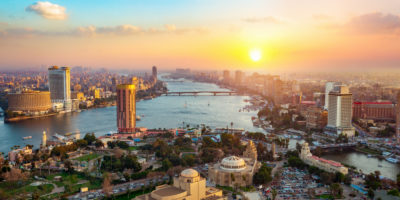-
埃及
Incentives for green hydrogen production in Egypt
25 8 月 2023
- 机构
- 外国投资
- 再生能源
Summary
Egypt aims to be Africa’s first green hydrogen producer by incentivizing companies to invest in the sector. Collaborative efforts with Germany and European companies are underway to enhance hydrogen projects and transport. Incentives include financial subsidies, tax exemptions, and administrative advantages, contingent on project conditions like commissioning, foreign funding, local materials use, and community development.
What is the status of green energy in Egypt and what role does green hydrogen play in this?
It is currently estimated that Egypt has the potential to generate 350 GW of wind energy and about 650 GW of solar energy per year, as per the Minister of Electricity and Renewable Energy’s (Mohamed Shaker El-Marqabi) declaration. As part of its National Climate Strategy 2050, Egypt has set itself the goal of reducing its carbon emissions, promoting the use of renewable energy sources and using alternative forms of energy, including green hydrogen. The importance the Egyptian government attaches to green hydrogen is evident, not least with the recent cabinet meeting on 17th of May 2023.
With a view to becoming the first African country to produce green hydrogen, new incentives for green hydrogen and derivatives projects were presented at the cabinet meeting. Based on an investment of 13 billion USD, the legal and financial benefits (new incentive package) that companies in this field can benefit from in the future were presented.
What agreements exist between Egypt and third countries to promote green hydrogen?
Agreement between Egypt and Germany on green hydrogen
The new incentive package was preceded by a meeting between the German-Egyptian Partnership for Green Hydrogen Projects committee and Egyptian officials on the 14th of March 2023. This resulted in a joint roadmap for supporting hydrogen production companies and promoting hydrogen transport and marketing. At this meeting, it was decided that the parties, the Egyptian Minister of International Cooperation (Rania Al-Mashat) and the Egyptian Minister of Public Enterprises (Mahmoud Esmat), will establish a platform to promote the use of green hydrogen.
At the above-mentioned meeting, Egypt and Germany signed two Memoranda of Understanding (MoU) to enhance cooperation in the field of green hydrogen.
The Egyptian Government also recently signed other MoUs with seven European leading companies and global alliances to produce new and renewable energy, to establish green hydrogen production complexes in Ain Al-Sokhna and the Red Sea Governorate.
The German-Egyptian cooperation in the field of green hydrogen follows Egypt’s goal to establish itself as a hub for producing green hydrogen.
Agreement between Egypt and third countries on green hydrogen
Egypt has also partnered with the European Union to advance green hydrogen production. Furthermore, in 2022, on the occasion of COP27, Egypt signed a series of MoUs with several international organisations to engage foreign investment in green hydrogen production and make Egypt a transit route for clean energy to Europe.
MoUs with global companies and alliances have defined the Red Sea Governorate as the location where green hydrogen projects will be carried out in the future.
Are there investment incentives for the production of green hydrogen in Egypt?
In the cabinet meeting of 17th of May 2023, the Egyptian Prime Minister Mustafa Madbuli stated that Egypt was offering the “largest” package of investment incentives and facilitations to companies wishing to invest in green hydrogen production projects in Egypt. He further announced the formation of a working group composed of representatives of the authorities involved to elaborate these investment incentives.
The statement indicated that companies involved in green energy projects in Egypt will benefit from incentives set out in the Law drafted in the cabinet meeting of 17th of May 2023 and Investment Law No. 72 of 2017. This targets companies involved in the “production, storage and export of green hydrogen”.
What investment incentives for the production of green hydrogen in Egypt are provided for in the draft Law of 17th of May 2023?
Financial incentives
Investments in the green hydrogen sector are subsidised in the amount of 33 % to 55 % of the income tax payable. The Ministry of Finance pays the subsidy within 45 days after the deadline for filing the tax return. The subsidy itself is not taxable. The exact conditions for the payment of the subsidy are still to be determined by the Cabinet.
All machinery, equipment, materials, consumables and vehicles (except private vehicles) used in green hydrogen and derivative projects are exempt from VAT.
No VAT is levied on exports of green hydrogen and its derivatives.
The Ministry of Finance pays most of the duties and certification costs associated with setting up the business and all import duties on imported goods used by the establishment. Further, it pays the taxes that would have been levied on the real estate used for the activity, if any.
Administrative incentives
Projects in the field of green hydrogen or its derivatives benefit from the so-called golden licence, as it is called in the Investment Law No. 72 of 2017.
All raw materials, spare parts and vehicles required for operations can be freely imported or exported directly or through distributors without the need for registration in the Importers’ Register.
The incentives apply to projects and their extensions throughout the contract period if the project agreements are concluded within a maximum of 7 years from the date of commercial commissioning.
Requirements
The investment incentives apply when:
- the project is commissioned within 5 years of the signing of the project agreement
- at least 70 % of the investment costs come from foreign funds
- at least 20 % of the locally used materials originate from Egypt
- training programmes are set up for local workers and know-how is shared
- the project company draws up a development plan for the communities in which it will operate
What investment incentives for the production of green hydrogen in Egypt are provided for in the Investment Law No. 72 of 2017?
The tax incentives granted under the Investment Law No. 72 of 2017 provide for special, general and additional incentives.
Special incentives
These are tax reductions limited to 7 years for projects that are started within 3 years (extendable to 6 years) after the provisions of the Law No. 72 of 2017 came into force (i.e. by October 2023). The investment costs consist of equity capital, long-term loans to finance the construction of the project’s movable and immovable assets, and working capital. The tax base is the taxable net profit, which is taxed at the following rates:
1) Tax exemption on 50 % of the investment costs for the implementation of a project in geographical locations with the greatest development needs (underdeveloped locations) designated by the Central Agency for Public Mobilization and Statistics (CAPMS)
The law identifies these sites as “Zone A”. According to the implementing regulations, “Zone A” includes:
- the Suez Canal Economic Zone
- the Golden Triangle Special Economic Zone
- the New Administrative Capital Zone
- the south of Giza province
- the provinces of Port Said, Ismailia and Suez (east of the canal) connected to the Suez Canal.
- border provinces, including Red Sea province south of Safaga
- the provinces in upper Egypt
- other areas in greatest need of development (to be determined by the Prime Minister)
2) Tax exemption on 30 % of the investment costs of a project located in the remaining geographical areas outside “Zone A”, referred to as “Zone B”, and operating in certain sectors.
This includes projects that:
- are active in the field of renewable energies
- export their products outside Egypt
- be carried out by a small or medium-sized (SME)
General incentives
Parallel to the special investment incentives, general investment incentives also apply. For example, projects are exempt from certain administrative requirements and fees for a period of 5 years from the date of their registration in the commercial register. Furthermore, temporary duty-free imports and exports are possible.
Additional incentives
Additional investment incentives may also be granted by decision of the Council of Ministers:
- special customs offices for the export or import of the investment project
- bearing of the value of the utility supply (such as electricity and water supply) of the property intended for the investment project or part thereof by the State
- partial bearing of the costs of a technical training programme for employees by the State
- reimbursement of half of the value of the land allocated for industrial projects, provided that the activity was started within two years of the transfer of the land
- free allocation of land for certain strategic activities
- under certain conditions, granting of a general permit for the construction, operation and management of the project as well as for the provision of the land required for this purpose. This permit shall also be deemed to be a building permit and shall be effective in its own right without any further action being required. In December 2022, the Egyptian Cabinet granted general approval for several projects.
- incorporation shares of capital companies subject to the Investment Law No. 72 of 2017 may be traded during the first two fiscal years of the company, subject to the approval of the competent Minister
- simplified acquisition of real estate, provided it is used for the project
Takeaways
- Egypt’s Green Hydrogen Drive: Egypt is strategically embracing green hydrogen production as a pivotal element of its renewable energy vision. The country’s ambitious goals and extensive incentives underscore its commitment to becoming a leading player in the global green energy landscape.
- International Collaborations: Collaborations with Germany and European partners highlight Egypt’s proactive approach to international cooperation in advancing green hydrogen technologies. Memoranda of Understanding and joint roadmaps are facilitating knowledge exchange and investments for robust hydrogen projects.
- Comprehensive Incentive Framework: Egypt’s multifaceted incentive framework, including financial subsidies, tax exemptions, and administrative benefits, showcases the government’s determination to attract investments in green hydrogen production. Stringent conditions for benefiting from these incentives emphasize the nation’s dedication to sustainable practices and local community development.
Egypt, with its rich history and vibrant economy, presents promising opportunities for foreign investors looking to expand their business horizons. However, entering a new market can be a complex endeavor, and understanding the intricacies of doing business in Egypt is essential for success. In this article, we will delve deeper into the various aspects of establishing and managing a company in Egypt, providing valuable insights and guidance for prospective investors.
Conducting Market Research
Before venturing into any new market, conducting thorough market research is crucial. Egypt is a diverse country with a dynamic market, and understanding the local nuances, consumer behavior, and market trends is essential. It is advisable for foreign investors to consider setting up an initial representative office, allowing them to conduct in-depth market research without fully committing to commercial operations. A representative office can employ local staff to gather market insights and report back to the parent company, enabling informed decision-making for future business initiatives. This representative office may not engage in any commercial activities and may not invoice. Hence, it is not subject to any corporate tax but will be subject to salary tax for its employees and withholding tax.
Choosing the Right Business Structure
When establishing a legal entity in Egypt, foreign investors have several options to choose from. The most common business structures for foreign direct investment are a One Person Company (OPC), Limited Liability Companies (LLCs) and Joint Stock Companies (SAEs) as 100% of the shares can be wholly owned by foreigners. The choice of structure depends on the nature of the business and the specific objectives of the foreign company. Alternatively, for specific projects or contracts with defined purposes, establishing a branch office can be a viable option.
The Company Establishment Process
Setting up a company in Egypt involves navigating through certain legal procedures. The Egyptian government has implemented measures to facilitate foreign investments and ensure a favorable business environment. Foreign investors can own 100% of their businesses in most sectors, and the minimum requirement for establishing a company is typically having at least one shareholder. In the case of LLCs, a minimum of two partners is required while in case of SAEs a minimum of 3 shareholders is required. It is important to note that a foreign director can be appointed, except for activities that require an import license, which necessitates an Egyptian partner and director.
Import and Distribution Considerations
For foreign entities planning to import and distribute goods in Egypt, specific considerations come into play. Obtaining an import license requires meeting certain criteria, including demonstrating a minimum turnover, meeting nominal capital criteria, and having an Egyptian partner holding at least 51% of the shares. These regulations aim to ensure local participation and collaboration in import-oriented activities.
Timelines and Administrative Processes
Understanding the timelines and administrative processes involved in establishing a company in Egypt is crucial for efficient planning.
While, foreign direct investors may establish the legal entity in one working day through GAFI as the commercial registry and tax card will be issued on the same day. However, the process may take up to six months, it can vary depending on various factors as follows:
- a significant factor is the legalization of documents, which may require coordination with embassies and consulates for the legalization of documents such as power of attorney, corporate documents, and their translated versions;
- opening a bank account for the company's capital needs to deliver all corporate documents related to the ultimate business owner (UBO) which may potentially cause delays.
Efficient Branch or Subsidiary Management
Once the company is operational, efficient branch management is vital for sustained success as clearly defining the director’s powers through the bylaws or separate agreements is recommended. Regular communication with local management, employing competent accountants, and maintaining oversight of operations are essential to maintain control and address any issues promptly.
Joint Ventures and Board Representation
In cases where foreign investors collaborate with local partners through joint ventures, establishing a board of directors plays a crucial role. The board oversees company management and decision-making processes. It is advisable for foreign shareholders to regulate their relations with their local partners by virtue of a shareholder agreement to ensure their representation on the board, allowing them to actively participate and safeguard their interests. Maintaining open lines of communication and regular meetings are fundamental for staying informed about the company’s performance.
Conclusion
Expanding into the Egyptian market holds immense potential for foreign investors. However, navigating the business landscape requires careful planning, market research, and adherence to legal procedures. By understanding the nuances of establishing and managing a company in Egypt, foreign investors can unlock new business opportunities and forge successful ventures in this dynamic market. With the right approach and strategic decisions, Egypt can prove to be a rewarding destination for those seeking growth and expansion
Would you like to know more?
Watch the video of this Episode here.
写信给 Christian
Why and How to set up a Company in Egypt
3 7 月 2023
-
埃及
- 公司法
Summary
Egypt aims to be Africa’s first green hydrogen producer by incentivizing companies to invest in the sector. Collaborative efforts with Germany and European companies are underway to enhance hydrogen projects and transport. Incentives include financial subsidies, tax exemptions, and administrative advantages, contingent on project conditions like commissioning, foreign funding, local materials use, and community development.
What is the status of green energy in Egypt and what role does green hydrogen play in this?
It is currently estimated that Egypt has the potential to generate 350 GW of wind energy and about 650 GW of solar energy per year, as per the Minister of Electricity and Renewable Energy’s (Mohamed Shaker El-Marqabi) declaration. As part of its National Climate Strategy 2050, Egypt has set itself the goal of reducing its carbon emissions, promoting the use of renewable energy sources and using alternative forms of energy, including green hydrogen. The importance the Egyptian government attaches to green hydrogen is evident, not least with the recent cabinet meeting on 17th of May 2023.
With a view to becoming the first African country to produce green hydrogen, new incentives for green hydrogen and derivatives projects were presented at the cabinet meeting. Based on an investment of 13 billion USD, the legal and financial benefits (new incentive package) that companies in this field can benefit from in the future were presented.
What agreements exist between Egypt and third countries to promote green hydrogen?
Agreement between Egypt and Germany on green hydrogen
The new incentive package was preceded by a meeting between the German-Egyptian Partnership for Green Hydrogen Projects committee and Egyptian officials on the 14th of March 2023. This resulted in a joint roadmap for supporting hydrogen production companies and promoting hydrogen transport and marketing. At this meeting, it was decided that the parties, the Egyptian Minister of International Cooperation (Rania Al-Mashat) and the Egyptian Minister of Public Enterprises (Mahmoud Esmat), will establish a platform to promote the use of green hydrogen.
At the above-mentioned meeting, Egypt and Germany signed two Memoranda of Understanding (MoU) to enhance cooperation in the field of green hydrogen.
The Egyptian Government also recently signed other MoUs with seven European leading companies and global alliances to produce new and renewable energy, to establish green hydrogen production complexes in Ain Al-Sokhna and the Red Sea Governorate.
The German-Egyptian cooperation in the field of green hydrogen follows Egypt’s goal to establish itself as a hub for producing green hydrogen.
Agreement between Egypt and third countries on green hydrogen
Egypt has also partnered with the European Union to advance green hydrogen production. Furthermore, in 2022, on the occasion of COP27, Egypt signed a series of MoUs with several international organisations to engage foreign investment in green hydrogen production and make Egypt a transit route for clean energy to Europe.
MoUs with global companies and alliances have defined the Red Sea Governorate as the location where green hydrogen projects will be carried out in the future.
Are there investment incentives for the production of green hydrogen in Egypt?
In the cabinet meeting of 17th of May 2023, the Egyptian Prime Minister Mustafa Madbuli stated that Egypt was offering the “largest” package of investment incentives and facilitations to companies wishing to invest in green hydrogen production projects in Egypt. He further announced the formation of a working group composed of representatives of the authorities involved to elaborate these investment incentives.
The statement indicated that companies involved in green energy projects in Egypt will benefit from incentives set out in the Law drafted in the cabinet meeting of 17th of May 2023 and Investment Law No. 72 of 2017. This targets companies involved in the “production, storage and export of green hydrogen”.
What investment incentives for the production of green hydrogen in Egypt are provided for in the draft Law of 17th of May 2023?
Financial incentives
Investments in the green hydrogen sector are subsidised in the amount of 33 % to 55 % of the income tax payable. The Ministry of Finance pays the subsidy within 45 days after the deadline for filing the tax return. The subsidy itself is not taxable. The exact conditions for the payment of the subsidy are still to be determined by the Cabinet.
All machinery, equipment, materials, consumables and vehicles (except private vehicles) used in green hydrogen and derivative projects are exempt from VAT.
No VAT is levied on exports of green hydrogen and its derivatives.
The Ministry of Finance pays most of the duties and certification costs associated with setting up the business and all import duties on imported goods used by the establishment. Further, it pays the taxes that would have been levied on the real estate used for the activity, if any.
Administrative incentives
Projects in the field of green hydrogen or its derivatives benefit from the so-called golden licence, as it is called in the Investment Law No. 72 of 2017.
All raw materials, spare parts and vehicles required for operations can be freely imported or exported directly or through distributors without the need for registration in the Importers’ Register.
The incentives apply to projects and their extensions throughout the contract period if the project agreements are concluded within a maximum of 7 years from the date of commercial commissioning.
Requirements
The investment incentives apply when:
- the project is commissioned within 5 years of the signing of the project agreement
- at least 70 % of the investment costs come from foreign funds
- at least 20 % of the locally used materials originate from Egypt
- training programmes are set up for local workers and know-how is shared
- the project company draws up a development plan for the communities in which it will operate
What investment incentives for the production of green hydrogen in Egypt are provided for in the Investment Law No. 72 of 2017?
The tax incentives granted under the Investment Law No. 72 of 2017 provide for special, general and additional incentives.
Special incentives
These are tax reductions limited to 7 years for projects that are started within 3 years (extendable to 6 years) after the provisions of the Law No. 72 of 2017 came into force (i.e. by October 2023). The investment costs consist of equity capital, long-term loans to finance the construction of the project’s movable and immovable assets, and working capital. The tax base is the taxable net profit, which is taxed at the following rates:
1) Tax exemption on 50 % of the investment costs for the implementation of a project in geographical locations with the greatest development needs (underdeveloped locations) designated by the Central Agency for Public Mobilization and Statistics (CAPMS)
The law identifies these sites as “Zone A”. According to the implementing regulations, “Zone A” includes:
- the Suez Canal Economic Zone
- the Golden Triangle Special Economic Zone
- the New Administrative Capital Zone
- the south of Giza province
- the provinces of Port Said, Ismailia and Suez (east of the canal) connected to the Suez Canal.
- border provinces, including Red Sea province south of Safaga
- the provinces in upper Egypt
- other areas in greatest need of development (to be determined by the Prime Minister)
2) Tax exemption on 30 % of the investment costs of a project located in the remaining geographical areas outside “Zone A”, referred to as “Zone B”, and operating in certain sectors.
This includes projects that:
- are active in the field of renewable energies
- export their products outside Egypt
- be carried out by a small or medium-sized (SME)
General incentives
Parallel to the special investment incentives, general investment incentives also apply. For example, projects are exempt from certain administrative requirements and fees for a period of 5 years from the date of their registration in the commercial register. Furthermore, temporary duty-free imports and exports are possible.
Additional incentives
Additional investment incentives may also be granted by decision of the Council of Ministers:
- special customs offices for the export or import of the investment project
- bearing of the value of the utility supply (such as electricity and water supply) of the property intended for the investment project or part thereof by the State
- partial bearing of the costs of a technical training programme for employees by the State
- reimbursement of half of the value of the land allocated for industrial projects, provided that the activity was started within two years of the transfer of the land
- free allocation of land for certain strategic activities
- under certain conditions, granting of a general permit for the construction, operation and management of the project as well as for the provision of the land required for this purpose. This permit shall also be deemed to be a building permit and shall be effective in its own right without any further action being required. In December 2022, the Egyptian Cabinet granted general approval for several projects.
- incorporation shares of capital companies subject to the Investment Law No. 72 of 2017 may be traded during the first two fiscal years of the company, subject to the approval of the competent Minister
- simplified acquisition of real estate, provided it is used for the project
Takeaways
- Egypt’s Green Hydrogen Drive: Egypt is strategically embracing green hydrogen production as a pivotal element of its renewable energy vision. The country’s ambitious goals and extensive incentives underscore its commitment to becoming a leading player in the global green energy landscape.
- International Collaborations: Collaborations with Germany and European partners highlight Egypt’s proactive approach to international cooperation in advancing green hydrogen technologies. Memoranda of Understanding and joint roadmaps are facilitating knowledge exchange and investments for robust hydrogen projects.
- Comprehensive Incentive Framework: Egypt’s multifaceted incentive framework, including financial subsidies, tax exemptions, and administrative benefits, showcases the government’s determination to attract investments in green hydrogen production. Stringent conditions for benefiting from these incentives emphasize the nation’s dedication to sustainable practices and local community development.
Egypt, with its rich history and vibrant economy, presents promising opportunities for foreign investors looking to expand their business horizons. However, entering a new market can be a complex endeavor, and understanding the intricacies of doing business in Egypt is essential for success. In this article, we will delve deeper into the various aspects of establishing and managing a company in Egypt, providing valuable insights and guidance for prospective investors.
Conducting Market Research
Before venturing into any new market, conducting thorough market research is crucial. Egypt is a diverse country with a dynamic market, and understanding the local nuances, consumer behavior, and market trends is essential. It is advisable for foreign investors to consider setting up an initial representative office, allowing them to conduct in-depth market research without fully committing to commercial operations. A representative office can employ local staff to gather market insights and report back to the parent company, enabling informed decision-making for future business initiatives. This representative office may not engage in any commercial activities and may not invoice. Hence, it is not subject to any corporate tax but will be subject to salary tax for its employees and withholding tax.
Choosing the Right Business Structure
When establishing a legal entity in Egypt, foreign investors have several options to choose from. The most common business structures for foreign direct investment are a One Person Company (OPC), Limited Liability Companies (LLCs) and Joint Stock Companies (SAEs) as 100% of the shares can be wholly owned by foreigners. The choice of structure depends on the nature of the business and the specific objectives of the foreign company. Alternatively, for specific projects or contracts with defined purposes, establishing a branch office can be a viable option.
The Company Establishment Process
Setting up a company in Egypt involves navigating through certain legal procedures. The Egyptian government has implemented measures to facilitate foreign investments and ensure a favorable business environment. Foreign investors can own 100% of their businesses in most sectors, and the minimum requirement for establishing a company is typically having at least one shareholder. In the case of LLCs, a minimum of two partners is required while in case of SAEs a minimum of 3 shareholders is required. It is important to note that a foreign director can be appointed, except for activities that require an import license, which necessitates an Egyptian partner and director.
Import and Distribution Considerations
For foreign entities planning to import and distribute goods in Egypt, specific considerations come into play. Obtaining an import license requires meeting certain criteria, including demonstrating a minimum turnover, meeting nominal capital criteria, and having an Egyptian partner holding at least 51% of the shares. These regulations aim to ensure local participation and collaboration in import-oriented activities.
Timelines and Administrative Processes
Understanding the timelines and administrative processes involved in establishing a company in Egypt is crucial for efficient planning.
While, foreign direct investors may establish the legal entity in one working day through GAFI as the commercial registry and tax card will be issued on the same day. However, the process may take up to six months, it can vary depending on various factors as follows:
- a significant factor is the legalization of documents, which may require coordination with embassies and consulates for the legalization of documents such as power of attorney, corporate documents, and their translated versions;
- opening a bank account for the company's capital needs to deliver all corporate documents related to the ultimate business owner (UBO) which may potentially cause delays.
Efficient Branch or Subsidiary Management
Once the company is operational, efficient branch management is vital for sustained success as clearly defining the director’s powers through the bylaws or separate agreements is recommended. Regular communication with local management, employing competent accountants, and maintaining oversight of operations are essential to maintain control and address any issues promptly.
Joint Ventures and Board Representation
In cases where foreign investors collaborate with local partners through joint ventures, establishing a board of directors plays a crucial role. The board oversees company management and decision-making processes. It is advisable for foreign shareholders to regulate their relations with their local partners by virtue of a shareholder agreement to ensure their representation on the board, allowing them to actively participate and safeguard their interests. Maintaining open lines of communication and regular meetings are fundamental for staying informed about the company’s performance.
Conclusion
Expanding into the Egyptian market holds immense potential for foreign investors. However, navigating the business landscape requires careful planning, market research, and adherence to legal procedures. By understanding the nuances of establishing and managing a company in Egypt, foreign investors can unlock new business opportunities and forge successful ventures in this dynamic market. With the right approach and strategic decisions, Egypt can prove to be a rewarding destination for those seeking growth and expansion
Would you like to know more?
Watch the video of this Episode here.




















